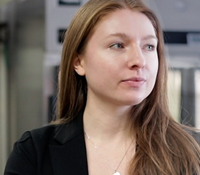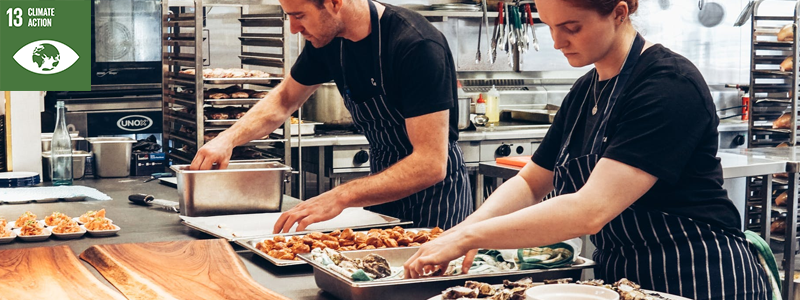
Improving Life on Land
Lang BComm graduate and current grad student Emily Robinson is committed to being a sustainable business leader.
Learn more
As businesses and governments unite to combat climate change, there is one industry which often gets overlooked as a serious contributor of global carbon emissions. While the manufacturing, and oil and gas industry receives the majority of the attention, the restaurant and foodservice industry is also a large contributor to greenhouse emissions. Challenges such as food and water waste, distribution of single-use plastics, overconsumption and overproduction in farming can be attributed to the restaurant industry, which reached an estimated $863 billion in sales in 2019.
Developing future business leaders that will integrate sustainable solutions within their restaurant operations is at the heart of associate professor Bruce McAdams teaching and research program.

McAdams, strongly encourages the implementation of the three stakeholder approach — students, researcher and community partner — to provide multiple perspectives on how restaurants can further incorporate the United Nation’s Sustainable Development Goals (SDGs) into their business plan. The three stakeholder approach also encourages the involvement of Hospitality, Food and Tourism Management (HFTM) students to be engaged in this experiential learning opportunity.
“We’ve got our finger on the pulse of these sustainability issues. Not only are we working to increase awareness of sustainability amongst restaurant owners, but we are also building skills in our students -- the future change-makers of the hospitality, food and tourism industry,” says McAdams.
Integrating real-world, practical knowledge is critical for students to learn about the impact which sustainability efforts can have. As the founder of the University of Guelph Sustainable Restaurant Project (UGSRP), McAdams partners with local restaurants to highlight how sustainability can be implemented within their business plan. Now in its 10th year, McAdams organizes an annual symposium where restaurant owners come together to discuss sustainability best practices within the industry. The Project is cemented on three goals -- create a more sustainability-focused curriculum for Lang hospitality students, leverage the environmental focus of the student-run restaurant, Pj’s, as well as work with community partners to promote sustainability in their restaurants.
The UGSRP platform also operates as an active blog that translates and mobilizes sustainability-focused research for those in the hospitality industry as well as HFTM students — this includes sustainable initiatives such as the environment, employee rights and fair trade imports.
A recent case study conducted by UGSRP focused on local, fair-trade coffee roaster, Planet Bean. Elaine Li, a UGSRP intern in her fourth year of Lang’s Bachelor of Commerce program, lead this discussion with Planet Bean to identify which SDGs they have implemented into their business plan and strategies to work towards a more sustainable future.
“Planet Bean is a testament to the endless possibilities when sustainability is incorporated in the business's core values, operations, systems and practices,” says Li. “Sustainability is a lifestyle for the individual, organizations and the community regardless of size, industry or other factors. We all have a role to play to make sustainability more than just a choice.”
Impressively, Planet Bean has accomplished 15 of the 17 goals.
“We must include students in this process as they are the future advocates and action takers to implementing sustainability,” says McAdams. “Sustainability is broad, and when we encourage discussion with this three stakeholder approach, we generate ideas that progress how businesses operate.”
As the restaurant industry attempts to recover from the global COVID-19 pandemic, which essentially stopped all aspects of the hospitality and foodservice industry, McAdams says now is the time to put a greater emphasis on sustainable solutions.
“Full-service restaurants are going to struggle the most as things 'open up.' It's important that the great progress and momentum in becoming more environmentally responsible is not lost,” says McAdams.
Learn more about Lang's Hospitality and Tourism Management major (BComm)


Lang BComm graduate and current grad student Emily Robinson is committed to being a sustainable business leader.
Learn more
Discover more stories of how the Lang School is helping achieve SDG#13: Climate Action
Learn more